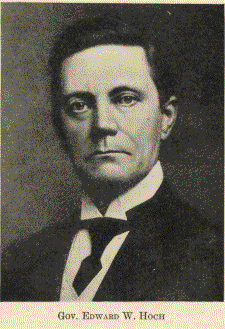| 1918 KANSAS AND KANSANS | Chapter 63 | Part 1 |
CHAPTER LXIII
EDWARD W. HOCH

[Copy by Willard of Portrait in Library of Kansas State Historical Society]
Edward W. Hoch, seventeenth Governor of Kansas, was born at Danville, Kentucky, March 17, 1849. He attended the common schools of that place, after which he entered the Central University of Danville. However, he did not remain until his graduation, but left school to enter a newspaper office. He spent three years learning to be a printer, after which he came to Kansas. In Marion County, he pre-empted 160 acres of land and became a farmer.
He soon gave up farming for the life of a country editor. He had many a hard struggle to keep his enterprise afloat, and it seemed at times that the paper was foredoomed to failure. In addition to the usual trials of the country editor, Hoch suffered much loss through the grasshoppers in 1874. It took him till 1876 to fully recover and pay up all his debts.
On May twenty-third of that year he was united in marriage with Miss Sarah L. Dickerson of Marion. They have four children, two sons and two daughters.
Hoch was a staunch Republican; his paper strongly advocated Republican principles. He was recognized by the Republican leaders as a man to be considered in settling party matters. He was elected to the Legislature in 1888 and again in 1892. This latter term was during the "Legislative War," and Mr. Hoch worked hard to gain recognition for the Republican House.
In 1894 he was urged to become a candidate for Governor. He did not do so, but in 1904 be was nominated and elected by the Republican party. He was re-elected in 1905.
The feature of the Legislature of 1905 was the contest of the State of Kansas with the Standard Oil Company. The oil resources of Kansas reached an advanced stage of development prior to this time. Oil fields in Neosho, Wilson, Montgomery, Chautauqua, Franklin and Miami counties were brought up to a production of over 3,000,000 barrels a year. It was a new industry in Kansas, and there were no laws governing the oil business. The oil producers felt the need of such laws, and determined to secure their enactment if possible. On the twelfth of January, a meeting was held in the office of H. E. West, at Peru, Kansas. William E. Connelley was directed to draft a call for a state meeting of the producers. Pursuant to this call they assembled at Topeka, and on the 19th of January, Connelley formulated the following resolutions, which were adopted by this meeting, and which organized the Kansas Oil Producers Association. They also outlined the laws believed necessary for the conservation and future development of the oil business.
Governor Hoch aided in securing the enactment of the seven laws demanded. That providing for the erection of a State refinery was declared unconstitutional by the Supreme Court. The other laws have stood the test of time, and have demonstrated the wisdom of their enactment. The Anti-Discrimination law has proven one of the most beneficial ever enacted. It immediately reduced the price of kerosene in the territory west of Manhattan from an average of twenty-one cents a gallon to an average of twelve cents a gallon. On the one item of oil it has saved annually to the people of Kansas at least six hundred thousand dollars. It is a general law, and applies to packinghouse products, flour, and all other manufactured articles. It is a conservative estimate to say that the Anti-Discrimination law has saved the people of Kansas annually one million dollars since its enactment.
Other important acts of this Legislature provided for the uniformity of railroad freight rates, the regulating of the working-hours of railroad employes, and the prohibition of special privileges. A child-labor law was passed and an act was also passed providing juvenile courts. Provision was made for a State Printing Plant. The D. A. R. were given an appropriation to mark the old Santa Fe Trail.
From September 26 to 29, the Pike Centennial was celebrated in Republic County, and by the school children generally, over the state.
The Legislature of 1907 elected Charles Curtis United States Senator. An act was passed by this Legislature reducing the railroad fare from three to two cents per mile, and an anti-pass law was enacted. A tax law providing for the assessment and taxation of property at its real value, was passed.
In 1908 Governor Hoch called a special session of the Legislature at which he urged the enactment of a primary election law, giving the people a chance to express their choice for United States Senator. This act was passed, along with several others.
Since he retired from the Governor's office, Mr. Hoch has done much in the lecture field. His eloquence has made him a favorite on the lecture platform. His son has active management of his paper. The family resides at Marion. He is now a member of the Board of Administration, in charge of the educational institutions of the State.
| 1918 Kansas and Kansans | Previous Section | Next Section |
A Standard History of Kansas and Kansans , written and compiled by William E. Connelley, transcribed by Carolyn Ward, 1998.
